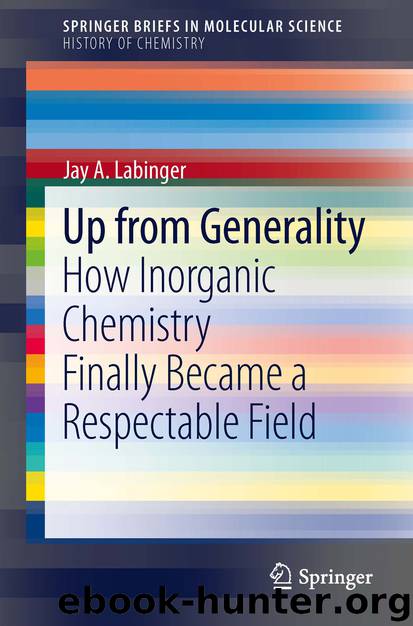Up from Generality by Jay A. Labinger

Author:Jay A. Labinger
Language: eng
Format: epub
Publisher: Springer Berlin Heidelberg, Berlin, Heidelberg
Yost was significantly involved in the war effort, seeking (and obtaining) a Naval Reserve commission (he had enlisted in the Navy during World War I), and participating in war-related research, including work on chemical warfare [22]. He was actively recruited for the Manhattan Project and apparently had every intention of moving to Los Alamos [23], but in 1943 he became seriously ill, with an infection of the jawbone, that kept him from going there—or doing much of anything at all—for many months. The disease indeed could well have been fatal, but for his being treated with penicillin, which at the time was newly developed and very difficult to obtain [11]. It is possible that Pauling played a role in pulling the strings needed to get a supply for Yost; even that Yost was a real ingrate for not being sufficiently appreciative. Caltech biologist James Bonner later recalled “Don Yost owed his life to Linus who…arranged for him to get penicillin, which was generally unavailable…and he survived to 97 (sic; in fact Yost lived to 83)!” [24]. Again, though, there is nothing explicit on this in the Yost archives.
After the war Yost returned to Caltech and resumed his research program. He continued to be highly regarded by the community at large; his archival files include correspondence about job offers from a number of government labs (Argonne, Brookhaven, Los Alamos) and universities (Chicago, Syracuse, Brandeis, UC Riverside). Several of the latter asked him to consider coming to chair their chemistry department, a move that would have surely been catastrophic for all concerned, given his iconoclastic attitude towards institutions (as we shall see shortly); he wisely declined to pursue those opportunities. It appears that he did accept an offer from Argonne, only to change his mind shortly thereafter [25]. A 1949 letter from Henry Taube asks to visit Yost and pick his brain on kinetics of substitution reactions [26]—a considerable compliment from someone of Taube’s stature.
Yost’s interest in research seems to have fallen off considerably from this point on. There are a couple dozen post-war publications, the last being the afore-mentioned 1959 mechanistic study on hypophosphorous acid [27]. However, it is clear from an epistolary exchange with his co-author [28] that the experimental work had been completed at least 6 years earlier, and the completion of the final manuscript was a long and unhurried process. By around 1953 he had completely stopped taking on graduate students [29]. His distaste for the institutional aspects of carrying out a research program may well have been a partial cause, as indicated in a later letter [30]:There isn’t much inorganic chemistry being done here at this Institute these days. The reasons are various, but some of them were due to struggles (competitions). First there was the struggle between professors and bookkeepers; the bookkeepers won. Then there was the struggle about admitting girls to the graduate school; the girls won.4 Next came the struggle between organic-biochemistry and physical-inorganic chemistry; the organikers won. Along with these struggles came one between professors and politicians; the politicians have almost won.
Download
This site does not store any files on its server. We only index and link to content provided by other sites. Please contact the content providers to delete copyright contents if any and email us, we'll remove relevant links or contents immediately.
| Africa | Americas |
| Arctic & Antarctica | Asia |
| Australia & Oceania | Europe |
| Middle East | Russia |
| United States | World |
| Ancient Civilizations | Military |
| Historical Study & Educational Resources |
Cat's cradle by Kurt Vonnegut(15343)
Pimp by Iceberg Slim(14494)
4 3 2 1: A Novel by Paul Auster(12382)
Underground: A Human History of the Worlds Beneath Our Feet by Will Hunt(12094)
The Radium Girls by Kate Moore(12022)
Wiseguy by Nicholas Pileggi(5775)
The Fire Next Time by James Baldwin(5434)
Perfect Rhythm by Jae(5400)
American History Stories, Volume III (Yesterday's Classics) by Pratt Mara L(5303)
Paper Towns by Green John(5184)
Pale Blue Dot by Carl Sagan(5002)
A Higher Loyalty: Truth, Lies, and Leadership by James Comey(4956)
The Mayflower and the Pilgrims' New World by Nathaniel Philbrick(4498)
The Doomsday Machine by Daniel Ellsberg(4487)
Killers of the Flower Moon: The Osage Murders and the Birth of the FBI by David Grann(4446)
The Sympathizer by Viet Thanh Nguyen(4387)
Too Much and Not the Mood by Durga Chew-Bose(4343)
The Borden Murders by Sarah Miller(4317)
Sticky Fingers by Joe Hagan(4191)
